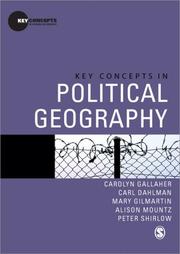| Listing 1 - 5 of 5 |
Sort by
|

ISBN: 0801461588 0801445701 9780801461583 9780801445705 9780801474262 0801474264 Year: 2011 Publisher: Ithaca, NY
Abstract | Keywords | Export | Availability | Bookmark
 Loading...
Loading...Choose an application
- Reference Manager
- EndNote
- RefWorks (Direct export to RefWorks)
The 1998 Belfast Agreement promised to release citizens of Northern Ireland from the grip of paramilitarism. However, almost a decade later, Loyalist paramilitaries were still on the battlefield. After the Peace examines the delayed business of Loyalist demilitarization and explains why it included more fits than starts in the decade since formal peace and how Loyalist paramilitary recalcitrance has affected everyday Loyalists.Drawing on interviews with current and former Loyalist paramilitary men, community workers, and government officials, Carolyn Gallaher charts the trenchant divisions that emerged during the run-up to peace and thwart demilitarization today. After the Peace demonstrates that some Loyalist paramilitary men want to rebuild their communities and join the political process. They pledge a break with violence and the criminality that sustained their struggle. Others vow not to surrender and refuse to set aside their guns. These units operate under a Loyalist banner but increasingly resemble criminal fiefdoms. In the wake of this internecine power struggle, demilitarization has all but stalled.Gallaher documents the battle for the heart of Loyalism in varied settings, from the attempt to define Ulster Scots as a language to deadly feuds between UVF, UDA, and LVF contingents. After the Peace brings the story of Loyalist paramilitaries up to date and sheds light on the residual violence that persists in the post-accord era.
Protestants --- Political violence --- Paramilitary forces --- Christians --- Forces, Paramilitary --- Paramilitaries --- Armed Forces --- Military art and science --- Political activity --- Ulster Volunteer Force. --- Ulster Defence Association. --- Loyalist Volunteer Force. --- LVF --- UDA --- UVF --- U.V.F. --- Northern Ireland --- Politics and government --- Militias (Paramilitary forces) --- Private militias
Book
ISBN: 1446279499 1283288834 9786613288837 1446204898 Year: 2009 Publisher: London ; Los Angeles : SAGE,
Abstract | Keywords | Export | Availability | Bookmark
 Loading...
Loading...Choose an application
- Reference Manager
- EndNote
- RefWorks (Direct export to RefWorks)
Covering the expected staples such as nationalism territoriality, scale and political economy, as well as anit-statism, the other, gender and post-conflict, this is an ideal companion text for students of political geography.
Digital
ISBN: 9780801461583 Year: 2011 Publisher: Ithaca, N.Y. Cornell University Press
Abstract | Keywords | Export | Availability | Bookmark
 Loading...
Loading...Choose an application
- Reference Manager
- EndNote
- RefWorks (Direct export to RefWorks)

ISBN: 9781412946728 9781412946711 1412946719 1412946727 Year: 2012 Publisher: Los Angeles Sage
Abstract | Keywords | Export | Availability | Bookmark
 Loading...
Loading...Choose an application
- Reference Manager
- EndNote
- RefWorks (Direct export to RefWorks)
Key Concepts in Political Geography is a new kind of textbook that forms part of an innovative set of companion texts for the Human Geography sub disciplines. Organized around 20 short essays, Key Concepts in Political Geography provides a cutting edge introduction to the central concepts that define contemporary research in political geography. Involving detailed and expansive discussions, the book includes: a) an introductory chapter providing a succinct overview of the recent developments in the field; b) over 20 key concept entries with comprehensive explanations, definitions and evolutions of the subject; c) extensive pedagogic features that enhance understanding including a glossary, figures, diagrams and further reading. Key Concepts in Political Geography is an ideal companion text for upper-level undergraduate and graduate students in political geography and covers the expected staples of the sub-discipline, such as nationalism, territoriality, scale, and political-economy, as well as relatively new arrivals to the field, including the other, anti-statism, gender, and post-conflict. Written by an internationally recognized set of authors, Key Concepts in Political Geography is an essential addition to any geography student's library. -- Back cover.
911.3:32 --- 911.3:32 Geopolitiek. Politieke geografie --- Geopolitiek. Politieke geografie --- Political geography --- Geography, Political --- Human geography --- Political geography.
Digital

ISBN: 9781588269720 Year: 2022 Publisher: Boulder Lynne Rienner Publishers
Abstract | Keywords | Export | Availability | Bookmark
 Loading...
Loading...Choose an application
- Reference Manager
- EndNote
- RefWorks (Direct export to RefWorks)
| Listing 1 - 5 of 5 |
Sort by
|

 Search
Search Feedback
Feedback About UniCat
About UniCat  Help
Help News
News